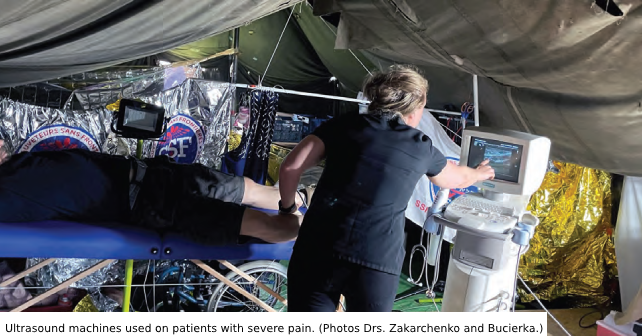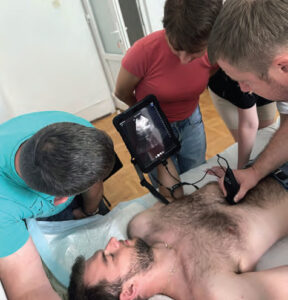
Svetlana Zakharchenko, DO, an emergency physician in New Jersey, left Ukraine for the United States 30 years ago—the closest she can get now to her old homeland is a camp in Poland at the border to Ukraine. The medical tent where Dr. Zakharchenko volunteers prominently sits at the front of the refugee camp with a sign welcoming the tired Ukrainians: “We treat anyone and everyone.”
Explore This Issue
ACEP Now: Vol 41 – No 11 – November 2022Four months into the Russian invasion of Ukraine and the ongoing war as a volunteer in the refugee camps of neighboring Poland, Dr. Zakharchenko takes blood pressure, listens to lungs, treats immediate medical needs, and refills what medications she can from the donated supplies. After returning to the U.S., she sat down to document her experiences.
“What can you do?” she wrote, “When your patient tells you what hurts the most isn’t their chest or the bruise on their arm—when a patient tells you, ‘My soul hurts.’”
Take 16-year-old Vanya. Dr. Zakharchenko wrote:
“When Mariupol, his home city, came under attack, everyone thought the fighting would be brief and that the war would soon end—no one predicted what actually happened, with the city now destroyed and lying in rubble.

Ukrainian physicians practice ultrasound skills using donated Butterfly devices during MedGlobal’s POCUS training in Ukraine.
“The Russian military controlled all entry and exit points. Day after day, the bombing and fighting intensified, but when his mother still refused to leave, Vanya left without her. There were three waves of people leaving Mariupol. The first wave was mostly children, and they were allowed to pass. The second wave was stripped and searched, their belongings confiscated, but they, too, were allowed to pass. The third wave was shot. It took Vanya a week to reach Poland on foot, and in the freezing February nights, many of the other refugees died along the road. Now he’s stuck in limbo, waiting in the refugee camp without knowing what comes next.”
Dr. Zakharchenko spoke with each patient she treated, and the stories all echo with tragedy—one woman in particular, Angelina, stands out. Dr. Zakharchenko writes:
“When the bombing started in Kharkiv, Angelina tried hard to maintain a sense of normalcy. Even as hospitals were shut down and whole neighborhoods disappeared in a pile of stones, caved in roofs, and cratered streets, Angelina and her husband went on a walk every day. At night, they were kept from sleeping by the constant shelling and rapid gunfire, tactics used by the Russians to instill fear in the civilians. There were power outages and food shortages, and people died at home from treatable conditions because the ambulances couldn’t reach them. Angelina and her husband persevered through all of it, but when a bomb fell so close to them that their daughter was almost lifted out of the stroller, they knew they had to leave.”
Pages: 1 2 3 | Single Page





No Responses to “Stories from the Ukrainian War: How Doctors and Refugees are Surviving”